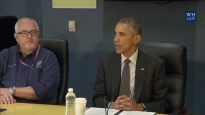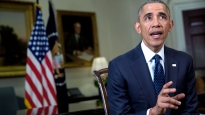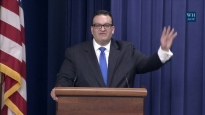President Obama Speaks After Meeting with Community Bank CEOs
December 22, 2009 | 5:33
The President discusses his meeting with small and community banks where he urged them to start lending to help the economic recovery. December 22, 2009. (Public Domain)
Remarks by the President after Meeting with Small and Community Bank CEOS
11:52 A.M. EST
THE PRESIDENT: All right, everybody. Well, it's good to see all of you. I just concluded a meeting with 12 regional community banks to have the same conversation that I had with some of the larger banks last week and that I've been having with CEOs of companies across the country over the last year, and that is how do we continue to consolidate the gains we've made over the course of this year in terms of economic recovery, but most importantly, how we move forward over the next year so that businesses are getting the capital that they need and that we are starting to see people hired again, people able to finance their homes, finance college educations and so forth.
Community banks serve a vital function all across the country. They are folks who know their customers, don't just lend them money but also provide them advice if they're entrepreneurs and getting started. They are intimately woven into the fabric of the community. I think it's fair to say that most of these community banks were not engaged in some of the hugely risky activities that helped to precipitate the financial crisis. At the same time, they continue to try to do their best in their local and regional markets to make sure that businesses who are now being affected by the overall recession are able to pick themselves back up.
What I did was to go around the room and to hear from each of them. Not all these communities are the same -- we've got everything from Kalamazoo to Harlem to small communities in Arkansas that focus mostly on farm loans.
There were some general themes that were out there -- one, that there are businesses that are looking for loans out there that are profitable, that are ready to make money. And the key is to match them up with banks that are in a position to lend. There are some banks that have seen the increase in the savings rate and higher deposits give them a pretty good capital base, but they're still constrained by some regulatory restraints.
We are looking to see if there are possibilities to cut some of the red tape. We don't have direct influence over our independent regulators, but we think that the more that we can highlight that in some ways the pendulum may have swung too far in the direction of not lending after a decade in which it had gone way too far in the direction of getting money out the door no matter the risk -- that if we can get that balance right that there are businesses and communities out there that are ready to grow again, and we just need to help make that happen.
I also had a discussion with all these bankers about the prospects for financial regulatory reform. As I said, many of the issues when it comes to large systemic banks and what precipitated the crisis on Wall Street don't apply to these smaller banks. Most of them are very supportive of the idea of financial regulatory reform. I think, fairly, they just want to make sure that as we regulate better, that that doesn't automatically mean that we're just loading them up with more paperwork and more burdens. And I think we do have an obligation to make sure that the regulatory schemes that we come up with are more streamlined and more efficient and send clear signals to the banks involved.
I did emphasize to them that community banks do have a responsibility to their customers and that many of these consumer protections and efforts to make our -- to create a single consumer financial protection agency would apply to them. And we think that's important, because every bank, large and small, is providing credit cards and providing debit cards and providing mortgage loans. And we think that the more we are making sure that banks aren't competing by how obscure their fine print is, but rather competing on the basis of the quality of their service and the terms of their loans, the better off consumers are going to be, and ultimately the better off banks are going to be as well.
So I very much appreciate them all coming in. I think the main message that I want everybody to take away, and certainly this is the message that I took away from the conversations here, is that there remains enormous opportunities as we come out of this recession for businesses to start growing again and to start hiring again. And everything that we're going to be doing here in the White House over the next several months is going to be geared towards catalyzing and spurring additional lending, particularly to small businesses, because we feel very optimistic that the work is behind us and that now is the time for us to seize opportunities.
With that, I want to wish everybody, if I don't see you guys before Christmas, a Happy Christmas -- a Merry Christmas and a Happy New Year.
All right? Thank you guys.
Q When do you think you'll leave?
THE PRESIDENT: Well, I will not leave until my friends in the Senate have completed their work. My attitude is, is that if they're making these sacrifices to provide health care to all Americans, then the least I can do is to be around and to provide them any encouragement and last-minute help if necessary.
All right? Thank you guys.
END
11:58 A.M. EST
|
May 31, 2016
|
May 31, 2016
|
May 31, 2016
|
May 31, 2016
|
|
May 30, 2016
|
May 30, 2016
|
May 28, 2016
|
May 27, 2016
|
- &lsaquo previous
- …
- 45
- 46
- 47
- 48
- 49
- 50
- 51
- 52
- 53
- …
- next &rsaquo







